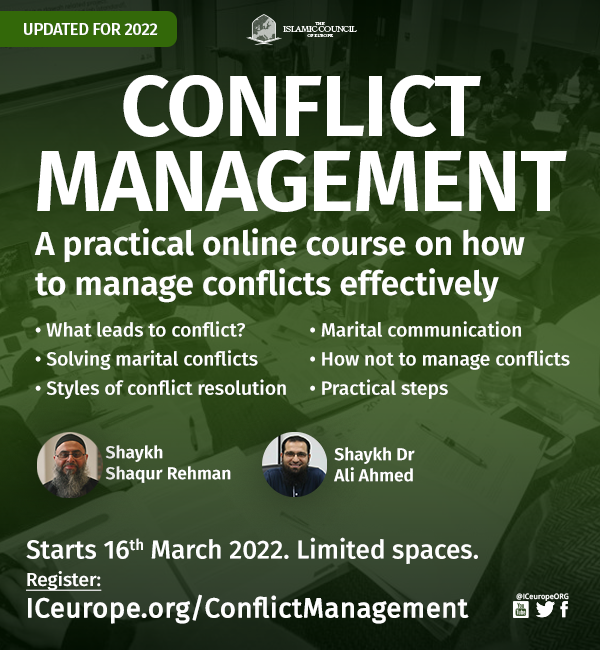Introduction
Muslims know full well the high regard their religion places in having good relationships with one’s family and the importance to maintain such bonds. However, achieving this isn’t always an easy endeavour. At the Council, the far majority of grievances that we address are connected to the deteriorating relationships between family members. In this piece, I would like to shed light on what I believe to be three critical tips that will go a long way in assisting us succeeding in both winning with our kin, and pleasing Allah, the Lord of man and Jinn.
Prophetic teachings and virtues on keeping good relations and ties of kinship
- Abu Hurayrah narrated that the Messenger of Allah (ﷺ) said:
Allah created the universe, and when He had finished, kinship [raḥim] stood up and said, ‘(O Allah) at this place I seek refuge with You from all those who sever me (i.e. sever the ties of kin).’ Allah said, ‘Yes, would it please you if I were to take care of those who take care of you and cut off those who cut you off?’ It said, ‘Of course.’ Allah said, ‘Then that is granted’. The Prophet (ﷺ) then said, “Recite, if you wish:
فَهَلْ عَسَيْتُمْ إِن تَوَلَّيْتُمْ أَن تُفْسِدُوا فِي الْأَرْضِ وَتُقَطِّعُوا أَرْحَامَكُمْ .أُولَٰئِكَ الَّذِينَ لَعَنَهُمُ اللَّهُ فَأَصَمَّهُمْ وَأَعْمَىٰ أَبْصَارَهُمْ .
‘Would you then, if you were given the authority, do mischief in the land, and sever your ties of kinship? Such are they whom Allah has cursed, so that He has made them deaf and blinded their sight.’(Sūrah Muḥammad, 47:22-23).[1]
- The Prophet (ﷺ) said,
The ties of kinship are suspended from the Throne, and it says: ‘Whoever upholds me, Allah will uphold him. Whoever severs me, Allah will sever him’.[2]
- He (ﷺ) also said,
‘Whoever would like his provision to be increased and his lifespan to be extended, let him uphold the ties of kinship’.[3]
- The duty of upholding ties with one’s kin was amongst the first fundamental messages the Prophet (ﷺ) gave on his arrival at Medina:
O people! Spread the Salām; feed the needy; connect the ties of kinship; and pray during the night whilst people are sleeping. If you do so, you will be admitted to Jannah in all peace, safety and security.[4]
The above is but a tiny selection amongst a plethora of scriptural texts that clearly demonstrate the obligation to keep familial ties, the rewards this entails, and the grave harms connected to severing them.
Three Tips to Win with our Kin
Let’s now explore the three matters that will support believers in their quest to succeed with family; the first deals with correcting your perceptions, the second with elevating your aspirations and the third with having to make a paradigm shift concerning who is actually on the other end of your relationship.
1. The Real Deal
Our religion pays great attention to giving clarity to concepts, attitudes, and norms of behaviour. It’s not a given that we all accurately perceive and judge matters as they should be; there are so many biases we fall prey to including ones that make us believe what we hold to be true cannot but be true. The Sharīʿah strives not only to sift out correct perceptions from incorrect ones but also aims at sharpening our understanding to recognise and value greater standards. For example, the Prophet (ﷺ) said:
Patience [ṣabr] is only at the first strike of calamity.[5]
Here the Prophet (ﷺ) is not saying that one cannot have ṣabr after a calamity first strikes, if it wasn’t demonstrated at its onset, but rather teaching us that the litmus test that exposes and benchmarks the reality of one’s ṣabr is to search for its presence at the first instant; it’s a higher calling that would curtail the devastating impact of rash and reactive behaviour at moments of crisis and difficulty.
In a similar vein the Prophet (ﷺ) said:
The strong person is not the one who can over wrestle others, but he is the one who can control himself when angry.[6]
Here again, the Prophet (ﷺ) does not mean that one who can over wrestle others lacks physical strength, but rather the intent behind his statement is to clarify that the strength that is truer and far superior is in the ability of a person to demonstrate self-control when enraged.
So, what of the topic of kin? Well, we live in a society that nurtures us to be reciprocal in nature, and the path of tit-for-tat seemingly rules the way. This social law of reciprocity can be just as powerful as the physical law of gravity, and can be just as difficult to escape. All of us are happy to present good conduct and behaviour towards the one who is extending the same to us; it’s when we are subject to bad behaviour that we feel justified in retaliating in a manner that may also be wrong. This is not what Allah wants of us, and nor is it what Allah praises.
On the contrary, our Prophet (ﷺ) tells us that this falls short of who the real wāṣil is – the one who correctly maintains the rights of kinship.
The Prophet (ﷺ) said:
The wāṣil is not the mukāfiʾ (i.e., one who is simply reciprocal in nature); rather the wāṣil is the one who connects the ties when his kin sever it.[7]
Here we learn how formidable responding to ill treatment with good treatment is in repairing relationships.
During perceived conflict, instead of being party to a downward spiral, we should be the stimulus that affects an upward spiral into motion – it just requires us to be the means of change and act against the grain.
The next time you are at the end of unfair treatment, respond in an overwhelmingly positive way and watch what happens – if at first you don’t see a change, put that down to stubbornness and continue to persist. It won’t be long, God-willing, before you forge a break in a good way, and others feel compelled to respond to us in kind.
2. Aim Sky High and Trim the Pettiness
I would not be as bold to say there is a causation – although I would like to – but will state that there is a correlation between not being preoccupied with high ambitions and being bogged down by pettiness. The extent to which trivial issues cause so much misery and pain between people never ceases to create amazement. Whilst there can be trivial matters that act as the straw that breaks the camel’s back due to the presence of more serious issues that are underlying, What I do intend are the cases where trivial issues themselves take centre stage and are the cause for the agony experienced.
The believer has a short life to live and there is never enough time to achieve everything one wants to achieve in this life. This world is a test; it is a place of transit and not the ultimate abode for happiness – that awaits the believer in the hereafter. Hence, the focus should be on how to win the hereafter and one needs to be concerned primarily with such thoughts: how to achieve the bliss of the hereafter and how to protect oneself from its harms. Inevitably, someone who thinks like this will then be propelled to have high ambition in this world and be conscious to achieve a legacy for themselves that would allow for translation of those efforts into success in the hereafter.
To be preoccupied in this manner helps one to avoid being consumed by matters that are lowly and of not much value even if such matters are impossible to escape; one must find ways to tolerate them, manage them and afford them their appropriate low priority. The Prophet (ﷺ) said,
Allah is certainly Beautiful, and He loves beauty. He loves the loftiest/noblest of affairs and dislikes the low/inferior affairs.[8]
This will reduce to a great degree the disproportionate and, at times, irrational disputes around Eid, weddings, food, visitations etc., which seem to take on a life of their own and culminate with the police being called out. Cultivate a yearning for superior matters and you will soon find yourself able to deal with the inferior ones even if you don’t get your way, whether you are the husband, wife, father, mother, son, daughter, brother, or sister. Take some time out and set yourself a vision with great aims to achieve. Remember – they need to connect to your vision in the hereafter – where do you see yourself and how high? This essential activity is never too late.
3. Deal with Allah
It’s so critical to remind yourself daily that the challenges you face with your close ones are simply manifestations of the ongoing trial and assessment you are under, which has been set by your Maker. You need to pass His test and you don’t get to decide which questions count. This reminder should be daily because if you don’t score well one day don’t allow that to limit you the next day. The Prophet (ﷺ) said:
Each person sets out early morning selling his soul, thereby setting it free or destroying it. [9]
Changing the way you think in such a fundamental manner and to realise that not only is Allah there in your relationships but that He is the one you need to please and desire foremost will empower you to undertake incredible efforts and adopt remarkable stances with your family and your community.
This mindset explains why the Prophet (ﷺ) rejected the offer to destroy his people although they had harmed him considerably and why Abu Bakr reinstated his maintenance for his cousin although he had slandered his daughter and the household of the Prophet (ﷺ); Prophets and righteous believers always seek to win with Allah and gain greater reward. They do not allow themselves to lose out by allowing egos to get the better of themselves. Imam Aḥmad educated his son as to why he chose to pardon those who had afflicted so much punishment against him by explaining that those who pardon others in this world will have their reward guaranteed by Allah and he cited the verse:
فَمَنْ عَفَا وَأَصْلَحَ فَأَجْرُهُ عَلَى اللَّهِ إِنَّهُ لَا يُحِبُّ الظَّالِمِينَ
…but whoever pardons and makes reconciliation – his reward is due from Allah. Indeed, He does not like wrongdoers.’ (Sūrah al-Shūrā, 42:40)
So, take on the challenge of looking beyond the person at the other end of the strained relationship and follow through until you find your Lord, at that moment revise the answer to the question you find yourself facing – it’s a guaranteed way to score more heavily.
In summary, rise
above reciprocity; get busy with great goals and do business with Allah. May
Allah grant us tawfīq to please Him; establish His rights upon ourselves and
those around us; and grant us relationships that are loving and rewarding –
Āmīn!
[1] Ṣaḥīḥ al-Bukhārī, Ḥadīth 5987, Ṣaḥīḥ Muslim, Ḥadīth 2554
[2] Ibid., Ḥadīth 5989, Ibid., Ḥadīth 2555
[3] Ibid., Ḥadīth 2067, Ibid., Ḥadīth 2557
[4] Sunan al-Tirmidhī, Ḥadīth 2485
[5] Ṣaḥīḥ al-Bukhārī, Ḥadīth 1283, Ṣaḥīḥ Muslim, Ḥadīth 926
[6] Ibid., Ḥadīth 6114, Ibid., Ḥadīth 2609
[7] Ṣaḥīḥ al-Bukhārī, Ḥadīth 5645
[8] al-Ṭabarānī, al-Mu‛jam al-Awsaṭ, Ḥadīth 6902
[9] Ṣaḥīḥ Muslim, Ḥadīth 223

Next course: Conflict Management
This course will help you proactively manage conflicts to mitigate their impact, thus allowing you to work towards successful relationships













